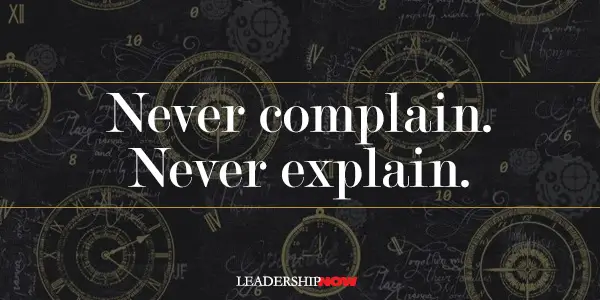 |
 |
10.22.07

Never Complain. Never Explain.
Christine Comaford-Lynch relates the following story in her book Rules for Renegades: There was once a monk who lived in a tiny hut on a hill overlooking a village. He kept to himself, only coming down to the village for food. In that village, a young woman had become visibly pregnant, and when her screaming father insisted on knowing who her lover was, she named the monk. An angry mob marched up the hill and stormed the monk’s hut. Whether people are praising you or trashing you, neither changes your intrinsic value. Don’t be easily swayed. It reminds me of a statement originally offered by prime minister Benjamin Disraeli, that Henry Ford II once famously said, "Never complain. Never explain." It's good advice. (Although, he probably meant it more as a corollary to the Fifth Amendment than good advice for leaders.) It speaks to accountability—personal accountability. “Never explain—your friends do not need it, and your enemies will not believe you anyway.” Although it gives your power to others, there are times to explain to obtain a positive resolution in a relationship. Explaining often draws you into conversations that are a complete waste of time. Silence is often your best friend. The Proverbs tell us, “When words abound, transgression is inevitable, but the one who restrains his words is wise.” Complaining is the outward expression of inner frustration. A complaint acknowledges that something is not as we think it should be. (And that may or may not be true. Quite often we lack all of the pertinent information.) The problem is that we often begin to complain as if that will lead to a solution. It rarely does. Complaining is outward focused and is a form of blaming. The issue is internal. If you can fix the problem, then you should quietly fix it. If you can’t, you should change your perspective on it and move on. Complainers generally have a lot to complain about because they are in fact, complainers. Complaining, explaining and excuse-making extend the time you are embroiled in the issue. It amplifies frustration—your own and others—spreads discontent and discord and generally makes you unpleasant. Jane Austin observed that "those who do not complain are never pitied." Pity, however, is not the goal of a well-adjusted person let alone a leader. Of more value is novelist Cesare Pavese comment that "one stops being a child when one realizes that telling one's troubles does not make things better." Recognize your part, take responsibility and move on.
Posted by Michael McKinney at 10:47 AM
|
BUILD YOUR KNOWLEDGE
 

How to Do Your Start-Up Right STRAIGHT TALK FOR START-UPS 
Grow Your Leadership Skills NEW AND UPCOMING LEADERSHIP BOOKS 
Leadership Minute BITE-SIZE CONCEPTS YOU CAN CHEW ON 
Classic Leadership Books BOOKS TO READ BEFORE YOU LEAD |